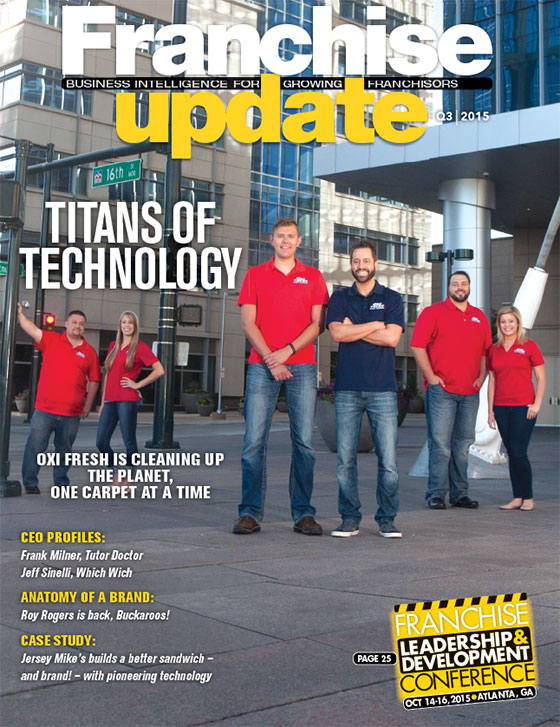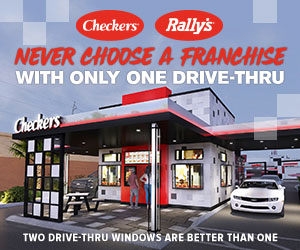Global Tech: How Franchise Brands are Using Technology Abroad

Technology has become essential to the operation of franchised businesses around the world. This incudes not only operating the actual business, but managing the franchisor-franchisee relationship across country and continent boundaries.
The use of technology around world is similar to that in the United States and Canada: franchise management, development, operations, training, social media, and marketing. POS systems that are web-based make keeping track of unit sales much easier and timelier no matter what country the franchisor expands into. To learn more about the use of technology in global franchising, we reached out to several franchise sector experts in key franchise countries, as well as several U.S. companies.
Chile
For the past 8 years, restaurants have used IT for better customer service and for administrative purposes. In some high-end restaurants, wines and cocktails are offered to clients using iPads, which are also use to manage the seating chart.
--Veronica Pinto, Commercial Specialist, U.S. Commercial Service, Santiago
India
India is providing technology to the world, but lags behind when it comes to using it! International brands entering India are using technology to connect with and support local partners. Because of large distances and time differences, brands remain connected to monitor and review business progression, especially when they start operations here. Also this is a huge tool for training and ongoing support. Domestic brands are relying on technology for franchise development. Because of the sheer size of the country, generating leads and recruitment of new franchisees is more effective through the Internet. Brands and franchisees are extensively using social media for marketing. Many franchising brands in food and retail are going online and have mobile applications for e-commerce. POS systems are getting more advanced and work more in the network environment to give real-time data for analysis and control. India's young population is very techno-savvy and adapts to these new tools very fast.
--Rajeev Manchanda, Managing Director, Inventure India, New Delhi
Mexico
Franchisors doing business in Mexico are using CRM and FMS systems to manage the development and administration (communication) of franchises. Although their use is not ubiquitous, it is widespread and gaining popularity; probably the greatest deterrent among emerging franchisors is the initial set-up cost. More and more franchisors are using electronic learning management systems (ELMS) to train franchisees, and web-based applications to provide franchisee support. The same applies to operations manuals, which are being digitized and distributed electronically. As for security, more and more franchisees are using web-based security systems to control and supervise their employees. At the unit level, franchisors are using more sophisticated POS systems that help them control and gather information on sales, inventories, royalties, etc. This information is often shared through web-based applications. We have seen both commercial off-the-shelf products being used, as well as in-house developed applications for larger franchise systems.
--Roberto Litwak, COO, Feher & Feher, Mexico City and Los Angeles
New Zealand
Xero, a New Zealand-based online accounting system also used in Australia and the USA, has special applications for the franchise sector. With GPS, mobile franchisees (vans) can be tracked by the franchisor as to their location and whereabouts (and especially if they go home often during the day and not work!). Learning management systems are extensively used in New Zealand, as they are in many countries, to remotely transfer the franchise business system to all who work in the franchise worldwide. Today franchise agreements in New Zealand (and elsewhere) have a detailed section covering franchise management package use and costs.
--Stewart Germann, Partner, Stewart Germann Law Office, Auckland
Southeast Asia
Social media (LinkedIn, Facebook, etc.), email campaigns, and online advertising are the most common uses of technology in the franchise sector in Asia. In many emerging markets, Facebook is the preferred communication tool of the middle and upper class. They use Facebook to arrange to meet in malls and restaurants. They have a smartphone penetration and the monthly Internet access is cheaper than cell and text charges. In Malaysia, half the population is on Facebook, 63 million in Indonesia, 16 million on the island of Taiwan, and 22 million in Vietnam. These tend to be the buyer or consumer class. So franchise marketing on Facebook is essential in such countries. McDonald's uses Facebook to advertise in Indonesia.
--Sean Ngo, CEO, VF Franchise Consulting, Ho Chi Minh City, Vietnam
United Kingdom
The U.K. uses technology in five major areas: 1) new franchisee recruitment (there is increased importance of recruitment websites); 2) digital marketing; 3) online inquiry tracking to measure effectiveness of promotional spend; 4) Skype for teleconferencing (from both PCs and mobile devices); and 5) automated inquiry handling systems and video testimonials. In the restaurant sector: tablets for menu ordering; contactless payment/Apple Pay, etc.; reservations by tablet/smartphone; tracking technology to promote special offers to customers in the vicinity of restaurants; extensive use of social media for promotion (e.g., Facebook likes, etc.); sophisticated use of EPOS systems (for managing payment, capturing customer information, reporting etc.); and video monitoring (the ability of management to look at remote restaurants/stores in real-time and see actual trading situation within the last 10 minutes). Mobile franchises make use of tracking technology for both vehicle movements and to advise customers of expected delivery. Product/service franchises use online ordering and online customer satisfaction surveys. For all franchises, the use of automated telephone answering/routing systems has become standard.
--Iain Martin, Director, The International Franchising Centre, York, England
U.S. companies
We also asked some U.S. companies with international operations or customers about their use of technology overseas.
- Sky Zone - Sky Zone, with licensees in six countries on four continents, uses a web platform for royalty billing, project management for new park opening/launching, and training.
--Glen Lord, COO - Sport Clips - Sport Clips uses a software program developed in Australia, Shortcuts, to manage all aspects of their business including appointment booking, client management, marketing, client feedback, and business performance.
--Gordon Logan, Founder and CEO - Two Men and a Truck - Technology has been critically important to our sustained growth over the past 6 years. Our web-based systems have enabled our international franchise system to gain operational efficiencies, increase sales by integrating marketing automation platforms, and even increase franchise expansion by enabling remote management. However, the most important aspect has been our ability to improve the decision-making process by leveraging objective data.
--Jon Nobis, COO - FranConnect - Our system helps 600 franchisors sell more franchises, manage franchise operations, build relationships with franchisees, and grow and manage franchisees' local marketing. The technology is web-based, so it isn't confined in terms of location and availability, and is accessible 24/7 and on all platforms. U.S. franchisors can provide master franchisees with a FranConnect system that mirrors the headquarters franchise sales processes, franchise information management systems, operational support, intranet, marketing system, etc., which allows the master and their sub-franchisees to have a consistent and branded set of tools to run the international franchise system throughout the franchisee lifecycle. In the unlikely event that a master franchisee were to leave, headquarters would have the means to assume or reassign the historical records, data, and other pertinent issues needed to keep the business running effectively. The tools provided cover many forms of international currency and are available in English, Spanish, French, Italian, German, and Portuguese. Importantly, FranConnect is compliant with many international rules relating to the privacy and security of consumer information when flowing back to the U.S., and is "Safe Harbor"-certified.
--Keith Gerson, CEO
The bottom line
How technology is being applied elsewhere is not so different than the technology applications being used in the United States and Canada. This should make franchisors a bit more comfortable with international expansion. Also, it is worth looking at systems developed elsewhere to increase productivity in global franchise management.
William Edwards, CEO of EGS LLC, has 40 years of international business experience. He has lived in 7 countries, worked on projects in more than 60, and has advised more than 50 U.S. companies on international development. Contact him at 949-375-1896, [email protected], or read his blog at edwardsglobal.com/blog
Share this Feature
Recommended Reading:
FRANCHISE TOPICS
- Multi-Unit Franchising
- Get Started in Franchising
- Franchise Growth
- Franchise Operations
- Open New Units
- Franchise Leadership
- Franchise Marketing
- Technology
- Franchise Law
- Franchise Awards
- Franchise Rankings
- Franchise Trends
- Franchise Development
- Featured Franchise Stories
FEATURED IN

Franchise Update Magazine: Issue 3, 2015








 The franchise listed above are not related to or endorsed by Franchise Update or Franchise Update Media Group. We are not engaged in, supporting, or endorsing any specific franchise, business opportunity, company or individual. No statement in this site is to be construed as a recommendation. We encourage prospective franchise buyers to perform extensive due diligence when considering a franchise opportunity.
The franchise listed above are not related to or endorsed by Franchise Update or Franchise Update Media Group. We are not engaged in, supporting, or endorsing any specific franchise, business opportunity, company or individual. No statement in this site is to be construed as a recommendation. We encourage prospective franchise buyers to perform extensive due diligence when considering a franchise opportunity.